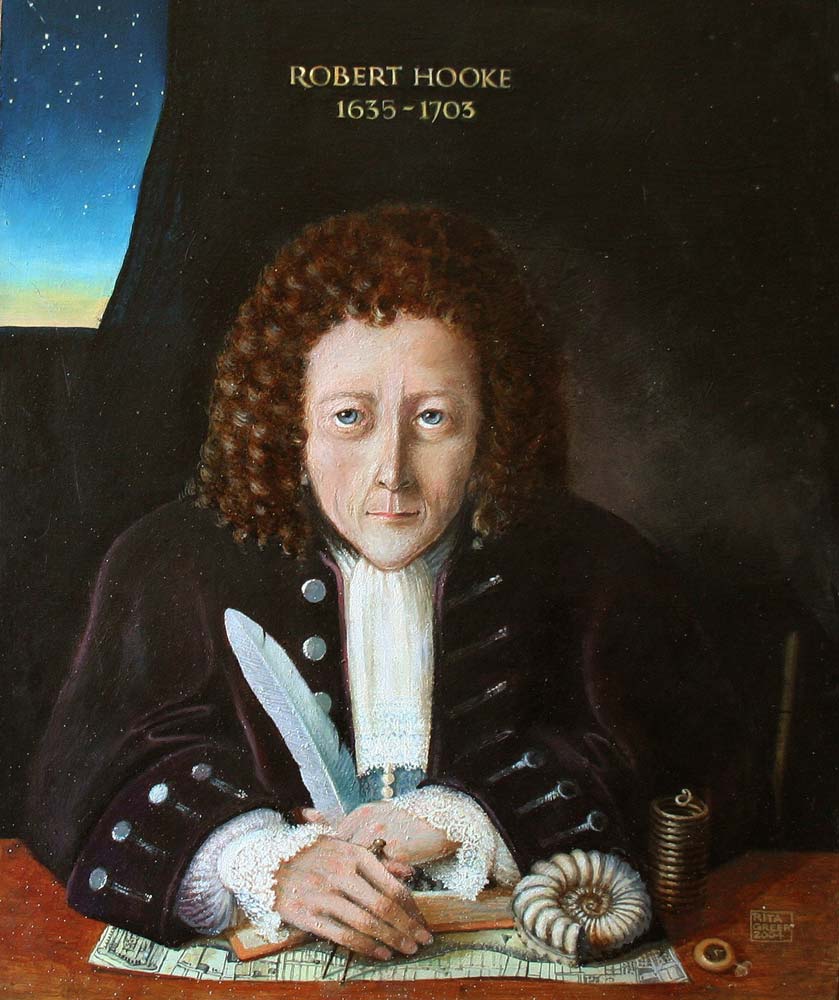| Robert Hooke | |
|---|---|
 |
|
| Scientist | |
| Specialty | Chemistry, Physics |
| Born | July 28 [O.S. July 18] 1635 Freshwater, Isle of Wight, England |
| Died | Mar 3, 1703 (at age 67) London, England |
| Nationality | English |
Robert Hooke is known as a renowned philosopher and a scientist who made many innovations and discoveries that few were capable of doing during his time.
Hooke’s Early Years
Robert Hooke was born on July 28, 1635, on the Isle of Wright in England. His father was a pastor and it was believed that young Hooke would follow in those footsteps. However, Hooke became fascinated with the art of observation and mechanical works. He once took apart a clock to see how it worked and then built a replica of his own that was fully functional. He would also go on to teach himself how to draw and he was fairly skilled at it.
After his father’s death in 1648, Robert Hooke took his small inheritance and enrolled in the Westminster School. It was here that he focused mainly on the study of mechanics.
University Years
In 1653, he moved to Oxford where he worked as a chemist’s assistant. This experience contributed greatly to Hooke delving further into the sciences and his studies. At the time, there was some controversy with the Protectorate ruling class that took the biblical teachings literally and was often at odds with science.
Robert Hooke navigated his studies and observations around the powers that be to continue to make innovative new discoveries while also avoiding drawing the ire of those who could cause him troubles.
Hooke’s Timekeeping Observations
Throughout his life, it seems that Hooke would apply his understanding of mechanics in many different ways. One such means was through his observations of the pendulum and how to improve it. The insights he procured did not revolutionize the industry of timekeeping, but the insights he gained were certainly helpful. Any new methods or discoveries that could improve how a clock works were going to be helpful with the creation of new clocks.
Interestingly, his innovations in areas of the pendulum were rooted in a new interest in astronomy. He was able to come up with improvements on the pendulum based on his study of gravity. Hooke might not receive as much credit as he should for his work in the realm of timekeeping, but his insights can discoveries certainly have proven to be valuable.
The Royal Society
In 1660, the Royal Society was founded and it contributed greatly to the furtherance of the study of science. Hooke would become a member of the Royal Society. He had published a brilliant article in the Micrography Observer that covered the topic of gravity as it relates to rising water. His innovative new discoveries brought him many fans in the scientific community and he would go on and invest further exploration in the study of gravity.
Financial Success
Robert Hooke often did not get the credit his contemporaries acquired. This is not to say Hooke got nothing for his efforts. In terms of monetary compensation, Hooke did go on and become quite wealthy from his endeavors. He earned money in a number of ways from his endeavors.
He was able to publish a collection of his work in a volume entitled Micrographia, which covered his microscopy observations. In time, he went on to become a Gresham Professor of Geometry. World fame might not have been in the cards for him, but he was able to maintain a solid and successful career in his profession. Privately, he did complain that others who he felt were less deserving had garnered more notoriety in their field.
Hooke might have grown somewhat bitter over the years due to the various perceived slights he felt over the recognition he believed he deserved. As a result, he became somewhat difficult to deal with and extremely ill at ease about any criticism he might have had to face. As a result, he strained many friendships.
Hooke’s Final Days
Robert Hooke died in March of 1703 in London. In his living space was found a massive amount of money. He seemed to not have squandered a shilling. He left a legacy of great work in mechanics and the sciences and now maintains some of the fame that eluded him in life.